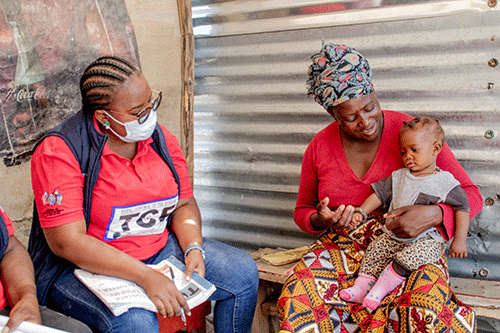Smiling and singing, a group of mothers in the Oshana region are celebrating the graduation of their children. But this is no ordinary graduation. All the mothers are living with HIV, and the graduating children are just 18 months old. By taking their anti-retroviral medicines consistently and correctly, the mothers have kept their infants HIV-free during pregnancy, birth, and breastfeeding for 18 months.
The graduation ceremony was organised by local civil society organisation – Development Aid from People to People (DAPP) – a partner organisation funded by the United States President’s Emergency Plan for AIDS Relief (PEPFAR) through the US Centers for Disease Control and Prevention Namibia (CDC). DAPP works with communities across Namibia to support HIV-positive pregnant and breastfeeding women to ensure that the virus is not passed from mother to child.
A statement by the US Embassy in Namibia quoted CDC Namibia country director Dr Brian Baker as saying these ceremonies are powerful testimonials to the resiliency of these women and the support provided by the programme to eliminate mother-to-child transmission of HIV.
“Celebrating the fact that these children are HIV-free at 18 months is something very special. Under the leadership of the Ministry of Health and Social Services, and through the support from PEPFAR, the children’s lives have been changed for the better,” he noted.
Many people in Namibia face challenges such as poverty, unemployment, and food insecurity. These pressures are just some of the reasons mothers living with HIV stop taking their medication. Some may not have the money to travel to their clinic for a medication refill, while for others, lack of job flexibility forces them to skip clinic visits. Other challenges are domestic violence, long distances to the local clinic and fear of stigma.
The first critical step to the 18 month-milestone is ensuring that pregnant women know their HIV status. With support from CDC and other partners, the MoHSS has ensured that 99% of pregnant women in Namibia know their HIV status. This is where the pregnancy care and support package offered by DAPP starts as it involves regular follow-up visits by community health workers. If a pregnant woman misses an appointment at the clinic, the community health worker goes into the community to find her and help her return to care. The results of this personalised support are overwhelming.
One of the mothers supported by the programme, Konstasia Shigwedha is happy that DAPP always reminds her of their appointment dates.
“Without them, I could not be up to date with my clinic follow-up dates because I sometimes have so much work to do which can make me forget. The field officers visit my house to see how the baby is and they have a discussion with me. I am happy for the information I get. It is helping me to keep my child free from the virus,” she said.
Today, less than 5% of HIV-positive mothers pass HIV to their children, compared to nine years ago when more than 13% of HIV-positive mothers in Namibia passed HIV to their children during pregnancy, delivery, or breastfeeding. It has been through the dedicated partnership between the governments of the United States and Namibia as well as organisations like DAPP, providing support to HIV-positive mothers, that children are able to remain HIV-free.
DAPP director Kirsten Moller-Jensen is delighted that today, children are growing up HIV-free, thanks to the support from PEPFAR through the CDC to the health ministry to end HIV in Namibia.



